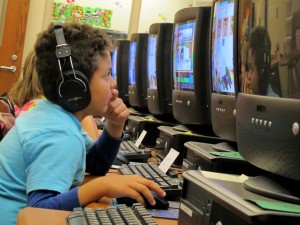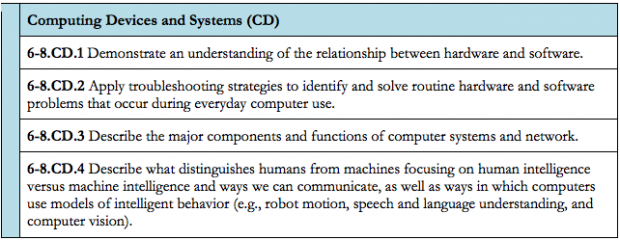Indiana’s New Science Standards Require Computer Science

For the first time, Indiana’s science standards include computer science standards for kindergarten through eighth grade student. (photo credit: Kyle Stokes / StateImpact Indiana).
The State Board of Education approved new sciences standards for K-12 students Friday. For the first time, computer science will be required for elementary and middle school students.
The Indiana Department of Education is required to update standards every six years. Jeremy Eltz, Assistant Director of College and Career Readiness for the DOE, oversaw the re-write of the science standards and says regular updates are especially important for science. He says, with scientific discoveries happening all the time and new technology being developed, it’s important to stay up to date.
The most notable change between the old science standards and the newly adopted ones is the addition of computer science for kindergarten through eighth grade. Eltz says the biggest focus for the re-write was wanting to change the standards from what they call ‘concrete standards’ (ex: know the parts of a cell) to ‘literacy standards’ (students learning how to think critically).
“They’re a little more broad, so you’re able to implement them in the physical, life and earth science content standards,” Eltz says.
To illustrate what he means, take a look at these computer science standards for sixth through eighth graders:  For a student to master “troubleshooting strategies to identify and solve routine hardware and software problems” they don’t need to be in a computer science class. This can be mastered while using computer programs in any subject, and that’s what Eltz means by ‘literacy standards’.
For a student to master “troubleshooting strategies to identify and solve routine hardware and software problems” they don’t need to be in a computer science class. This can be mastered while using computer programs in any subject, and that’s what Eltz means by ‘literacy standards’.
“Students have skills, proficiencies, and are capable of understanding and achieving certain things in all subject areas,” Eltz says. “So we want to see the computer science standards embedded in English class, math class, social studies, music, things like that. Those should be taught across the board, not just in your science class.”
The new standards also include engineering standards, which are also flexible enough to be taught in other classes.
(View all of the standards and compare them to old science standards here.)
“It’s going to take infrastructure and access and resources for kids to really be able to experience that and learn it as much as they can,” says DOE spokesperson Samantha Hart. “Going forward, we’re going to need to be working with the General Assembly to make sure that the resources are there at the local level.”
Elton says these resources include teacher training.
“This summer and over the fall we’re going to provide a substantial amount of professional development, support and resources,” Eltz says.
